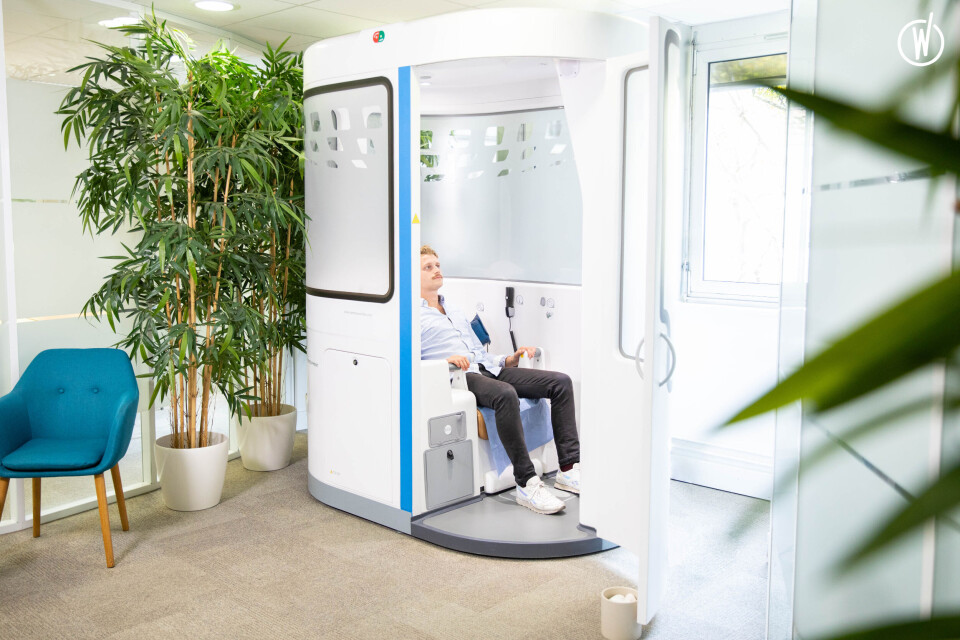-
Health reimbursements linked to income supported by French state auditor
The controversial move aligns with prime minister's plans to cut costs
-
Doctors threaten strike against bill mandating where they work in France
The new bill aims to combat ‘medical deserts’ but young doctors say it will ‘deteriorate access’
-
More than 5,000 French communes use AI to identify poor rubbish sorting
Badly-sorted rubbish can cost millions so communes are turning to high-tech solutions
Health cabins: virtual GP visits becoming more popular in France
Some communes are installing fully equipped ‘health cabins’ that offer basic medical equipment and digital contact with a doctor

Suppliers of ‘health cabins’ – small booths with screens, loudspeakers and basic medical equipment such as stethoscopes and blood pressure cuffs – are reporting growing interest as more patients opt for virtual GP appointments.
The cubicles offer digital contact with a doctor, known as télémédicine.
The doctor talks through the procedures to record vital signs and, once a diagnosis is reached, can write a prescription which is printed out in the cabin for the patient.
Medical appointments via the internet or by telephone rose sharply in France in 2020, driven largely by the pandemic.
An official report by the regulator charged with digital health matters, the Agence du Numérique en Santé (ANS), said there were 400,000 consultations in the whole of 2019, compared to a million a week at the height of the lockdowns.
Read more: Complementary health insurance in France: what it is and how it works
This was helped by a government decision to charge teleconsultations at the same rate as normal GP visits through the carte Vitale system.
French company H4D, which claims to be the global leader in health cabin provision, started developing booths in 2008.
Among the company’s customers is John Billard, mayor of Le Favril in Eure-et-Loir, northern France, who installed a cabin there in October 2019.
The village, which has a population of around 350, also allows other patients in the area to use the booth.
The district has just one GP surgery and it often takes days to get an appointment.
“The idea was to see how things went for two years, but of course Covid changed everything. Now, with the situation a bit calmer, and with the government making using the cabin with a carte Vitale easy, we usually have between five and seven people every week,” Mr Billard said.
Le Favril’s cabin cost around €100,000 for installation (the room it is housed in was provided free by the commune), and running costs are around €1,000 a month.
The mayor’s secretary, a volunteer or a member of the conseil municipal manages the appointments and helps people install themselves. The actual consultation, including taking blood pressure and pulse, is done by the patient on their own, with a doctor (usually based in a call centre in Paris or Brittany) directing.
Read more: New online health space: What it changes for residents in France
Mr Billard says he often has queries about the cabin from other mayors who are worried about difficulties attracting doctors to their communes.
Surveys carried out for ANS show that 60% of French people think teleconsultations are a good idea and might try them, and 75% of doctors who use teleconsultations are satisfied with the results.
The report noted that some doctors do not bother with specialist software, and instead use telephones or platforms such as Skype or Facetime.
There have been no reports of consultations being hacked.
Meanwhile, an experimental télésurveillance (remote monitoring) program where patients use devices to send readings like blood pressure and glucose levels to doctors over the internet is being extended.
It has been trialled since 2018 for patients with diabetes, heart, kidney and lung problems, and to keep an eye on people fitted with pacemakers.
The extension of a few months will avoid a gap between the end of the trial and the introduction of widespread reimbursement of remote monitoring by social security later in 2022.
The government has allocated €600million to develop digital tools in medicine, and one other result might soon be the introduction of a secure email service, so that x-rays, scans, and letters to specialists can be sent to doctors automatically, instead of the present system where patients carry their own medical files to appointments.
Related stories:
10 million in France benefit from free glasses and dental work scheme
How to get a weekend or out-of-hours doctor’s appointment in France
French hospitals to set flat fee of €19.61 for A&E care from January 1
























